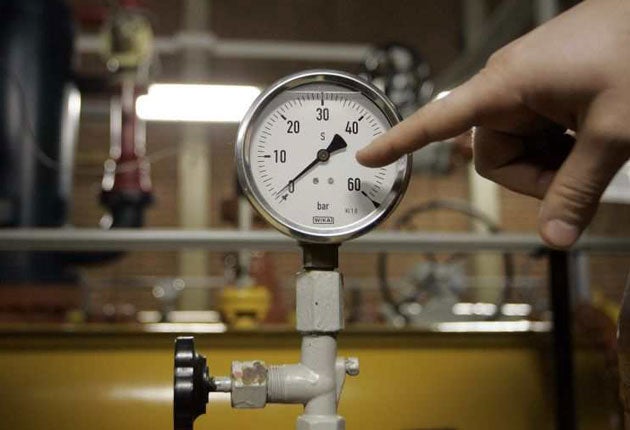Europe's heating goes off
Hundreds of thousands of people in Balkans left exposed to sub-zero temperatures as gas row hits home

Russia has shut down all gas flowing to Europe, sparking fear and anger in the bitterly cold Balkans, where hundreds of thousands of people were forced to weather sub-zero temperatures without heating, schools were closed and firms shut down production.
One of the worst-affected countries was Bulgaria, where at least 45,000 households had no central heating as power plants switched from gas to other fuels. The Mayor of the capital Sofia demanded the cabinet's resignation, as heating was shut down on public transport and gas-powered buses and taxis ground to a halt.
"We can't believe this is happening in the 21st century in the capital of an EU country," said Keti Angelova, a management consultant who lives in the capital, where temperatures were expected to plunge to -11C overnight.
"I felt the temperature in my flat change yesterday, the radiators and the water went colder, and now I am wearing extra clothes to keep warm," she said. "The electricity company is telling families to gather in one room to use as little power as possible. It's so depressing."
In the Bosnian capital Sarajevo, gas supply was cut to 76,000 houses and residents said the deep freeze they were having to endure was reminiscent of the 1990s siege of the city that cut gas, electricity and water to the majority of the population. "What is this? This is like wartime again," said Belma Panjeta, a 25-year-old lawyer whose home lost its gas supply last night.
Almir Becarevic, the head of Bosnia's gas firm, said: "In all the countries affected by this problem, people could start dying of cold as extremely low temperatures are forecast to hit us as of Thursday. This could result in a real humanitarian disaster."
Some shops reported running out of electric heaters, with 500 being snapped up from just one department store. Kenan Zahirovic, a software developer sent home from work because his office was too cold, said he was afraid the situation could get worse if the increased demand for electricity overloaded the city's grid.
The row over gas prices and debts owed by Ukraine to Russia has been rippling across the continent. Eastern European countries have been hard hit, as they are reliant on the pipelines that transit through Ukraine from Russia, but the crisis is also having an impact further west. Supplies to Germany and France have been cut although both nations have alternative sources and bigger stocks to fall back on.
Russia began reducing the gas flowing through the Ukraine pipeline on 1 January but yesterday it stopped it flowing completely, with both Moscow and Kiev blaming the other for the crisis. Ukraine's energy chief refused to pay more than $201 per 1,000 cubic metres for gas, less than half Russia's proposal and demanded a higher fee for allowing Russia to pump gas to Europe across its territory.
The heads of Russia's Gazprom and Ukraine's Naftogaz, the two state-owned companies at the heart of the crisis, are both scheduled to fly to Brussels today for talks with the EU's energy commissioner, Andris Piebalgs. And an informal ministerial gathering in Prague is expected to rubber-stamp a plan to send monitors to the Ukrainian-Russian border to examine gas flows to Europe. This could shed light on whether Ukrainian authorities have been withholding gas reserves being delivered from Russia, as the Kremlin has repeatedly alleged.
Almost 20 countries around Europe have been affected by the gas stand-off. The European Commission president Jose Manuel Barroso gave a clear warning that Kiev's aspirations for closer ties could be hurt. "Ukraine says it wants to be closer to the EU," he said. "If it wants to be closer, it should not create any problems when it comes to EU energy supplies." Meanwhile the US took Moscow to task. "Cutting off these supplies during winter to a vulnerable population is just something that is unacceptable to us," said a State Department spokesman.
Even if there is a breakthrough and gas supplies are restored, it will take days to get the full volumes of gas being pumped through to fill depleted reserves. And across eastern Europe, shivering people are asking why their own leaders – and the EU – have failed to diversify their energy supply and reduce dependence on Russia. "I hope that, whatever Russia and Ukraine are fighting for, the crisis will be over by the weekend – if not, it will be a nightmare," said Ms Angelova. "It's so sad that the welfare of so many people depends on the mood of two countries."
Chilling out: Who's without gas?
Gas flows stopped: Austria, Turkey, Greece, Hungary, Czech Republic, Slovakia, Bosnia, Serbia, Bulgaria, Poland, Slovenia, Croatia, Macedonia, Romania, Moldova.
Gas flows massively reduced: Germany, Italy, France.
-11C
Forecast temperature in Sofia last night.
Join our commenting forum
Join thought-provoking conversations, follow other Independent readers and see their replies
0Comments